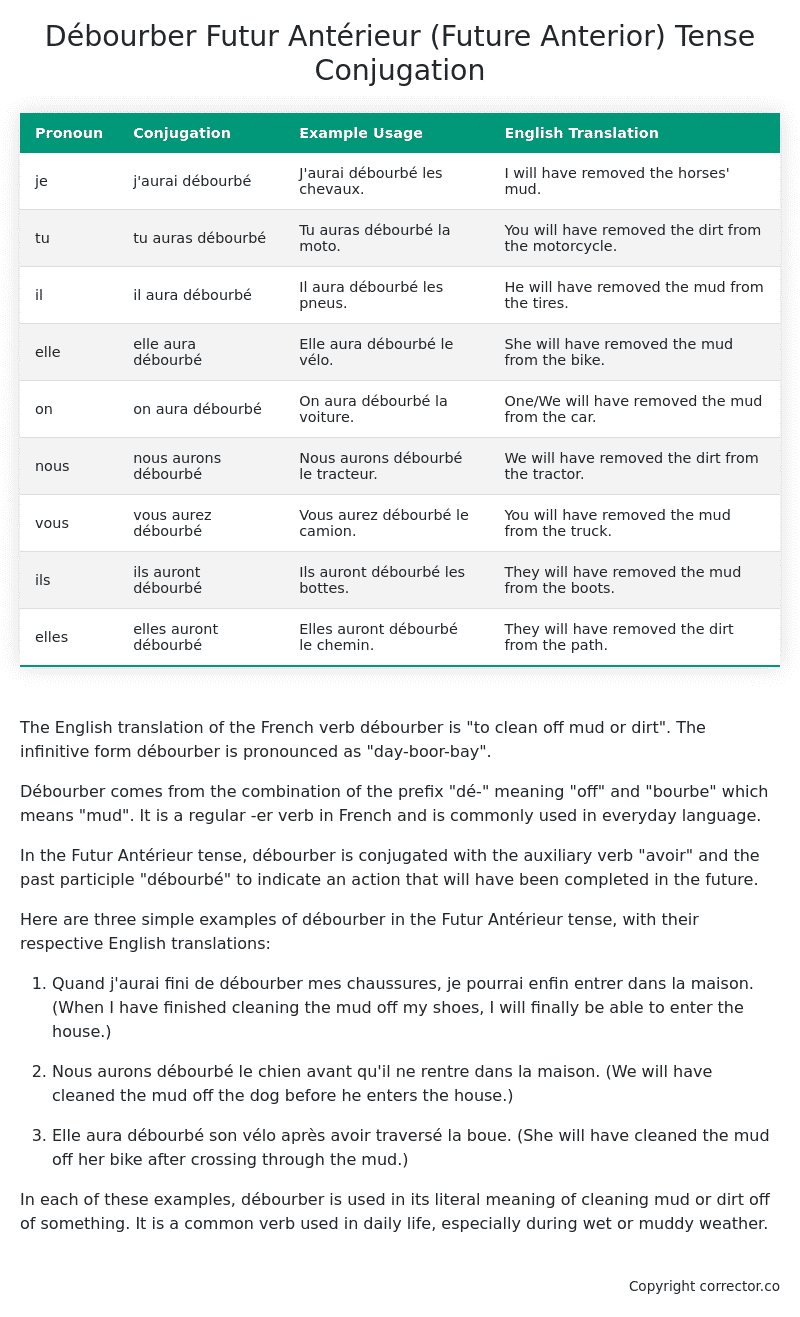Futur Antérieur (Future Anterior) Tense Conjugation of the French Verb débourber
Introduction to the verb débourber
The English translation of the French verb débourber is “to clean off mud or dirt”. The infinitive form débourber is pronounced as “day-boor-bay”.
Débourber comes from the combination of the prefix “dé-” meaning “off” and “bourbe” which means “mud”. It is a regular -er verb in French and is commonly used in everyday language.
In the Futur Antérieur tense, débourber is conjugated with the auxiliary verb “avoir” and the past participle “débourbé” to indicate an action that will have been completed in the future.
Here are three simple examples of débourber in the Futur Antérieur tense, with their respective English translations:
-
Quand j’aurai fini de débourber mes chaussures, je pourrai enfin entrer dans la maison. (When I have finished cleaning the mud off my shoes, I will finally be able to enter the house.)
-
Nous aurons débourbé le chien avant qu’il ne rentre dans la maison. (We will have cleaned the mud off the dog before he enters the house.)
-
Elle aura débourbé son vélo après avoir traversé la boue. (She will have cleaned the mud off her bike after crossing through the mud.)
In each of these examples, débourber is used in its literal meaning of cleaning mud or dirt off of something. It is a common verb used in daily life, especially during wet or muddy weather.
Table of the Futur Antérieur (Future Anterior) Tense Conjugation of débourber
| Pronoun | Conjugation | Example Usage | English Translation |
|---|---|---|---|
| je | j’aurai débourbé | J’aurai débourbé les chevaux. | I will have removed the horses’ mud. |
| tu | tu auras débourbé | Tu auras débourbé la moto. | You will have removed the dirt from the motorcycle. |
| il | il aura débourbé | Il aura débourbé les pneus. | He will have removed the mud from the tires. |
| elle | elle aura débourbé | Elle aura débourbé le vélo. | She will have removed the mud from the bike. |
| on | on aura débourbé | On aura débourbé la voiture. | One/We will have removed the mud from the car. |
| nous | nous aurons débourbé | Nous aurons débourbé le tracteur. | We will have removed the dirt from the tractor. |
| vous | vous aurez débourbé | Vous aurez débourbé le camion. | You will have removed the mud from the truck. |
| ils | ils auront débourbé | Ils auront débourbé les bottes. | They will have removed the mud from the boots. |
| elles | elles auront débourbé | Elles auront débourbé le chemin. | They will have removed the dirt from the path. |
Other Conjugations for Débourber.
Le Present (Present Tense) Conjugation of the French Verb débourber
Imparfait (Imperfect) Tense Conjugation of the French Verb débourber
Passé Simple (Simple Past) Tense Conjugation of the French Verb débourber
Passé Composé (Present Perfect) Tense Conjugation of the French Verb débourber
Futur Simple (Simple Future) Tense Conjugation of the French Verb débourber
Futur Proche (Near Future) Tense Conjugation of the French Verb débourber
Plus-que-parfait (Pluperfect) Tense Conjugation of the French Verb débourber
Passé Antérieur (Past Anterior) Tense Conjugation of the French Verb débourber
Futur Antérieur (Future Anterior) Tense Conjugation of the French Verb débourber (this article)
Subjonctif Présent (Subjunctive Present) Tense Conjugation of the French Verb débourber
Subjonctif Passé (Subjunctive Past) Tense Conjugation of the French Verb débourber
Subjonctif Imparfait (Subjunctive Imperfect) Tense Conjugation of the French Verb débourber
Subjonctif Plus-que-parfait (Subjunctive Pluperfect) Tense Conjugation of the French Verb débourber
Conditionnel Présent (Conditional Present) Tense Conjugation of the French Verb débourber
Conditionnel Passé (Conditional Past) Tense Conjugation of the French Verb débourber
L’impératif Présent (Imperative Present) Tense Conjugation of the French Verb débourber
L’infinitif Présent (Infinitive Present) Tense Conjugation of the French Verb débourber
Struggling with French verbs or the language in general? Why not use our free French Grammar Checker – no registration required!
Get a FREE Download Study Sheet of this Conjugation 🔥
Simply right click the image below, click “save image” and get your free reference for the débourber Futur Antérieur tense conjugation!

Débourber – About the French Futur Antérieur (Future Anterior) Tense
Construction
Common Everyday Usage Patterns
Interactions with Other Tenses
For example
Summary
I hope you enjoyed this article on the verb débourber. Still in a learning mood? Check out another TOTALLY random French verb conjugation!


